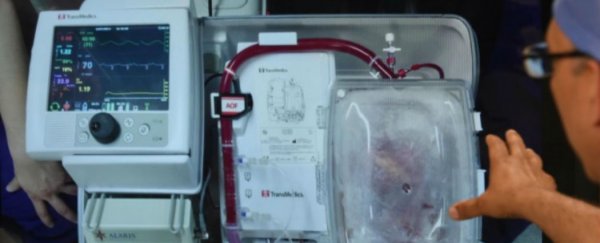Surgeons in Cambridge have successfully installed a new type of heart transplant in a 60-year-old patient who is reportedly doing great, leaving the hospital just four days after the procedure.
Prior to this procedure, heart transplants have only ever been able to be done using still-beating hearts. This means that if a person dies in a car accident, they can't donate their heart to a person needing a transplant, and instead, transplant patients have to rely on donations from people who have fallen into a permanently vegetative state. But now, researchers have figured out how to successfully transplant non-beating hearts, which means a whole lot more organs could suddenly become available.
"The use of this group of donor hearts could increase heart transplantation by up to 25 percent in the UK alone," lead surgeon, Stephen Large, told Ian Sample at The Guardian.
The patient, named Huseyin Ulucan, suffered a heart attack in 2008, and agreed to receive treatment, which involved inserting a non-beating heart in his chest cavity within five minutes of the donor dying, and restarting it in situ. The activity of the heart was then assessed via ultrasound for 50 minutes, and if everything still looks great, and the heart is still happily beating away, the surgeons will go ahead with the transplant, swapping out the recipient's defective heart for the donated heart.
Once the surgeons decide they're going to perform the transplant after waiting 50 minutes, the beating donor heart is placed in a 'heart-in-a-box machine', which circulates blood and nutrients through it for three hours while the patient is prepped. The same device is used to get other organs, such as livers, kidneys, and lungs, ready for transplantation.
The patient, who is now recovering from the procedure at home, told the BBC that before the surgery, he could barely walk, and had trouble breathing. Now he's making his own way to his hospital appointments for the first time since his original heart started to degrade.
"Currently patients can wait over three years for a heart transplant," Simon Messer, a cardiothoracic transplant registrar at the Papworth Hospital, where the procedure was carried out, told The Guardian. "But less than half of the people on the waiting list will be transplanted. About 13 percent die while they are waiting, and around 30 percent are removed from the list, because they become too unwell to have the operation."
Sources: The Guardian, The BBC
